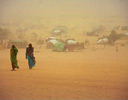
It would be an understatement to say that there is a great deal going on right now in volatile regions of eastern Chad (which, in case this fact escaped you, borders Darfur). I’ll get to the region’s raging threats of armed banditry and insecurity shortly, but first, a new and looming problem in eastern Chad is that—thanks to the Sudanese government’s callous decision to expel key international aid agencies providing lifesaving aid to Darfur—an additional 1.5 million Darfuris may be forced to flee across the border into another dangerous region in search of food, water, and healthcare. And an on-again, off-again problem for Chad is the lurking presence of a coalition of Chadian rebels who are currently gearing up for their third run on the Chadian capital, N’Djamena, from their rear base in Darfur.
Into this abyss comes an important transition with incredibly inconvenient timing. Thanks to the pace of United Nations processes, this transition came as no surprise, and has, in fact, been on the books for a while. However, given the recent developments in neighboring Darfur, now is not the best time for such a dramatic transition to occur. As mandated by the U.N., on March 15, the 3,360-strong European Union force—known as EUFOR—that served as the peacekeeping component of the U.N. peacekeeping mission in eastern Chad, or MINURCAT, became a 5,000-strong U.N. peacekeeping force. The additional peacekeepers are from Bangladesh, Togo, Malawi, and Uruguay, among other nations (see this helpful Q and A from Oxfam for more information on the EUFOR-MINURCAT transition as well as BBC’s coverage from the official handover in Abéché).
But what does the EUFOR-MINURCAT transition mean, and how does it relate to the extremely tense situation in eastern Chad right now?
The European Union maintains that “no security gaps will occur” during the troop turnover, because 2,000 of the 3,360 EU troops previously stationed in eastern Chad will remain on the ground as part of the new MINURCAT mission. Unfortunately, as the New York Times noted today, these new troops will not arrive overnight; the Times reports that the new force will begin with 2,300 soldiers and “expects to have 3,900 by June…and 5,200 by the end of the year.” This means that the number of peacekeeping troops in eastern Chad will actually decrease substantially before it eventually increases beyond the EU’s original force size.
The EU’s assertion also sidesteps the reality of bandit- and arms-ridden eastern Chad, where insecurity has reigned throughout EUFOR’s yearlong mission; a particularly damning Oxfam report last fall found that EUFOR has done little to improve the security of civilians and to protect internally displaced Chadians and Darfuri refugees from continued attacks. Oxfam and other groups have already expressed their concern for the safety of civilians in the transition period. And I have to wonder, what is stopping the Chadian rebels from attempting to use the lag time inevitably created by the EUFOR-MINURCAT transition period to launch their third attempt to take the capital?
Also unfortunately, the increase in the number of peacekeeping troops authorized by the U.N. Security Council for MINURCAT is not guaranteed—or even likely—to improve the security situation in eastern Chad, because, as I noted back in December when MINURCAT’s new mandate was approved by the Security Council, the new mandate is simply “more of the same.” From another post I wrote in December:
…the U.N. has continued to shy away from even minor efforts to address the political crisis in Chad (by focusing on ending the rampant culture of impunity, for example). The U.N. could play a key role in laying the groundwork for an internationally-backed comprehensive political solution in Chad. Instead, MINURCAT’s approach continues to ignore the connection between instability in the East and a brutally repressive government in N’Djamena.
It is hard to be optimistic about the ability of the MINURCAT peacekeepers—even with their increased force size—to ameliorate the (in)security situation that now reigns in eastern Chad absent significant revisions to the peacekeepers’ mandate. The chances of such revision in the near future are slim, but the mandate troubles may be the least of MINURCAT’s concerns in the coming weeks.
Although Victor Angelo, the U.N. Secretary General’s representative in Chad, recently claimed that MINURCAT had arrested “81 high-caliber rebels,” the problematic Chad-Sudan proxy war has enabled Chadian rebels bent on regime change in N’Djamena to sustain themselves by camping out in Darfur. Meanwhile, not even SRSG Angelo would deny that the Darfuri rebels lurking in refugee and internally displaced persons camps in eastern Chad—namely the JEM rebels—are a persistent security threat that EUFOR and MINURCAT have proved incapable of containing.
The next several weeks may become a trial by fire for the new MINURCAT peacekeeping forces, but hopefully the bolstered force will be able to claim more successes than its predecessor.

